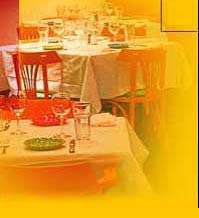


 To �Serve� With Love!
To �Serve� With Love!
Suvir Saran �I have been cooking since I was six. My family has a maharaj who must be about 62 and who came to us from Awadh. I used to keep a diary of all that this maharaj did in the kitchen, I used to note the secret ingredients he used in his food, and I learnt a lot from him. Subsequently, I spent time in the Bukhara kitchen of the Maurya Sheraton in New Delhi with Chef Manjit Singh Gill. And everytime my family went out to a friend's home or to a hotel, I would spend time with the cooks and chefs in their kitchens and try to find out why there were different from our Panditji at home.�
|
|
Suvir has had no formal training in cooking, though he is teaching New York how to cook Indian food. He describes his learning process: �I have been cooking since I was six. My family has a maharaj who must be about 62 and who came to us from Awadh. I used to keep a diary of all that this maharaj did in the kitchen, I used to note the secret ingredients he used in his food, and I learnt a lot from him. Subsequently, I spent time in the Bukhara kitchen of the Maurya Sheraton in New Delhi with Chef Manjit Singh Gill. And everytime my family went out to a friend's home or to a hotel, I would spend time with the cooks and chefs in their kitchens and try to find out why there were different from our Panditji at home.�
He comes from a family of bureaucrats, lawyers and doctors. Suvir wanted to be a surgeon himself, or a painter. �Both are creative jobs,� he explains. �But I left for the US when I was 18, my parents gave me the confidence and the support to do what I wanted.� And what he is doing is cooking and being involved with food in New York. The department of nutrition and food studies of New York University, which offers a Ph.D in the subject, has asked him to conduct a class for its students. �The director of the department liked the food I had cooked at some dinner and called me next day for a job,� Suvir says. �My classes are most popular and they are sold out. When the New York Magazine did a feature on cooking schools in the city, it covered my class. And when it wrote about the top 40 caterers of New York, I was the seventh, and my dessert, orange and mango souffle, made it to the cover.�
He also teaches Indian cooking from home in New York. Suvir describes �home�. �It is my little India, 1,500 square feet of Indian environment that is like the India of my dreams that stopped existing 15 years ago. Ever square inch is an imprint of India, I have artefacts, pottery, ceramics, paintings, cutlery and crockery and cooking appliances, spices, some 1,600 antiquities.� His students include American and Indian professionals, bankers, lawyers, doctors. He is a vegetarian but he cooks all kinds of foods. There is no issue about cooking non-vegetarian food without tasting it, he says. �I concentrate on my sense of touch, I can cook just by feeling, there is no need for me to taste the food. I have perfected the art of putting just the right amount of salt in the food through the sense of touch. This is a throwback to my maharaj at home who used to cook food and not taste it because he believed that the food must first be offered to God. It's a matter of andaz.�
There have been instances when chefs have been skeptical about letting him into their cooking areas because, after all, Suvir comes into the industry without any formal cooking qualifications. �They tend to dismiss me at first, then seeing my confidence, they test me out. They ask me questions. When I start talking about food, when I tell them the history of food, the culture and politics behind it, the spice wars, how the British, Portuguese and Dutch came here to influence our cuisines, this breaks the ice and they start respecting me. Then they see me in action, and they realise I have a passion for food, I live for it, the rest is easy.�
Suvir will not get involved with the Indian restaurant business in New York more than being a consultant. �I help them decide what steps they should take, I find an architect for them, I locate the Indian elements, I build the Indian environment, I source out chefs, draw up the menu, I create recipes, do the pricing, I define an image they can brand for the American media to understand. But I won't give my name to a restaurant. Madhur Jaffrey and Ismail Merchant sold themselves to the US. I won't do that till I have ownership of a restaurant. I want Indian food to get where I want it, so when I open my own restaurant, I come into a safe and stable environment! The American media is unforgiving. It gives you one chance only. When I open a restaurant, I'll do everything so that my first attempt is successful.�
But before that, there's a book on Indian home cooking in the US that he is working on. It will be approachable and easy for foreigners to pick up and cook from. Indian cookery books are too exotic. Mine will not be about saris and dhoties. It will demystify Indian cooking.�
He says he cooks five days a week, two times a day. �My home in New York is like the one in New Delhi. Guests come unannounced. It is like the Churchgate Station of New York. And I am cooking for everyone, often cooking till 5 in the morning, that�s a peaceful time to create food!�
|

Home Page
About the mag
Subscribe
Advertise
Contact Us